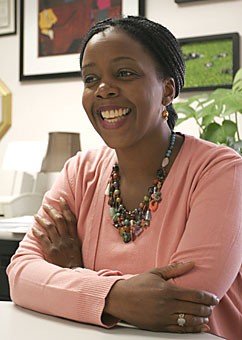UA law students have teamed up with undergraduates to provide Spanish speakers with better access to free legal advice within the Domestic Violence Law Clinic.
The Domestic Violence Law Clinic at the James E. Rogers College of Law, now in its 10th year, pairs law students with undergraduates in a Mexican-American translation and interpretation program to help them better understand the needs of Spanish-speaking clients, said Zelda Harris, the clinic’s director.
This is the first semester the clinic has offered interpretation services from students, she said.
The clinic provides free legal advice to members of the community who have suffered domestic abuse, Harris said.
Undergraduate student interpreters, in a new practicum course delivered with assistance from the Spanish and Portuguese department and the Mexican-American Studies and Research Center, have been lending help by meeting with clients and law students to interpret conversations and translate documents.
Domestic Violence Law Clinic is a practicum course in the translation major. Students receive three credits for completing it.
The course is a great opportunity for translation students to practice the skills they learn in school, said Jaime Fatás Cabeza, assistant professor of the translation and interpretation program and a federal-court-certified interpreter.
“”There is a great need for professional communicators who are accurate and thorough, and who behave professionally and ethically in legal or health-related fields,”” he said.
He added that that practicum courses provide service learning and practical training for students, and a way to give to a community that is “”historically underprivileged by public institutions.””
While students are taught how to translate textual documents, they are also trained how to read embedded meanings and be receptive to language, which includes understanding cultural perceptions, Fatás Cabeza said.
Currently, 12 law students and a social worker intern are enrolled in a Domestic Violence Seminar course, LAW 696B, that involves the strictly legal side of domestic violence cases, Harris said. Students can receive three to six credits for the course.
Harris said she hopes to explore more possibilities involving other languages within the community.
“”We hope we can continue to serve the community in the future,”” she said. “”It’s a way for (students) to get practical experience going to real court.””
Amber Byers, a third-year law student involved with the program, said she relies on the help of undergraduate translators at the clinic and feels they make the clients feel more comfortable, too.
For non-native English speakers, the program is an integral part of the legal process, Fatás Cabeza said.
“”We are the conduit that makes communication possible,”” he said.
The clinic is at Rogers Roundtree Hall, 1145 N. Mountain Ave., which has meeting rooms and work areas.
“”Providing equal access to people with limited linguistic proficiency is a win-win situation,”” Fatás Cabeza said.
Jill Holt, a third-year law student, said she likes the seminar because it differs from typical courses.
“”I think there’s a real need for this in Tucson,”” Holt said. “”I find it really interesting and rewarding.””
Fatás Cabeza said he hopes to see more diversity-awareness programs at the UA.
“”Cultural diversity adds such richness to our society,”” he said. “”A program like this is instrumental in bridging the gap.””









